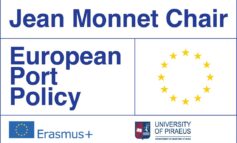PortEconomics co-director Thanos Pallis discusses the relationship between port cities, ports and cruise activities in an introductory chapter of the collection Cruise Port City Compass-Global Cases Inspiring Sustainable Connections & Communities published by MedCruise and AIVP.
The publication counts on the participation of different stakeholders. Fifteen working group members highlight the best practices and initiatives carried out in their respective cruise ports from seven countries worldwide on key topics such as environmental protection and energy transition, port city interface and waterfront, governance, dialogues, and economic impact.
Finally, academia, national governments, international organisations and reputed experts round up the publication, providing an overview of complementary perspectives.
In his chapter, Thanos discusses the evolution of the relationship between port cities, ports and cruise shipping, emphasising the importance of enhancing the quality of the symbiosis via different streams of initiatives – You might read the contribution here: Port-Cities, Ports and Cruise: Enhancing a Mutually Beneficial Symbiosis
About the Publication
 ‘Cruise Port City Compass – Global cases inspiring sustainable connections & communities‘ is the outcome of the collaboration between the international Associations MedCruise, the Association of Mediterranean Cruise Ports and AIVP – Association Internationale Villes et Ports.
‘Cruise Port City Compass – Global cases inspiring sustainable connections & communities‘ is the outcome of the collaboration between the international Associations MedCruise, the Association of Mediterranean Cruise Ports and AIVP – Association Internationale Villes et Ports.
The publication benchmarks good practices, identifies challenges, and enhances stakeholder dialogue regarding cruise-port city interactions, providing good practices for sustainable growth and development.
The document is conceived as a “compass” for cruise ports and their communities, as it provides good practices for their sustainable growth and development. At the same time, this publication will help us understand what challenges and issues still need to be addressed. It contributes to the existing and ongoing dialogue and actions developed at the European and global levels by the main institutions, associations, and bodies that have committed themselves to the sustainable development of cruise tourism and port-city relations.
Trois-Rivière (Canada), Marseille (France), and Dubrovnik (Croatia) showcase the three different stages of the cruise sector’s development in the port city context. In addition to port authorities and municipal governments, technical and infrastructural providers are key in building a sustainable cruise-port city citizen relationship. Two global leaders in their respective fields are Wabtec and Global Ports Holding.
The first result of the work highlights the need for further exploration, including defining principles for sustainability, engaging new actors, and conducting additional research with experts. These initial steps are encouraging, and while we are still navigating, this compass guides us in the right direction.
You might read the publication here: Cruise Port City Compass










